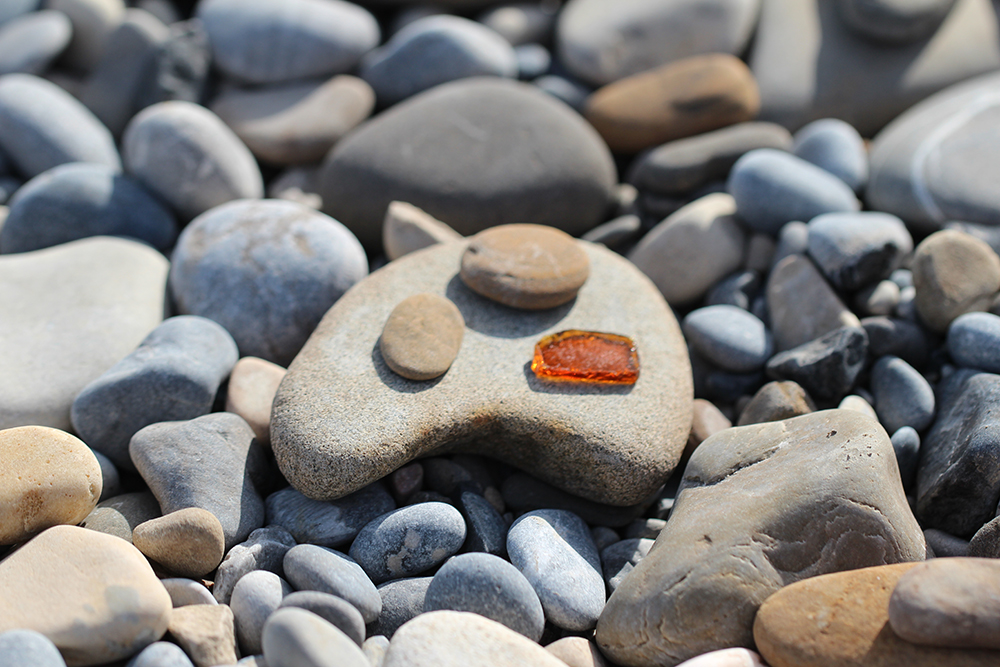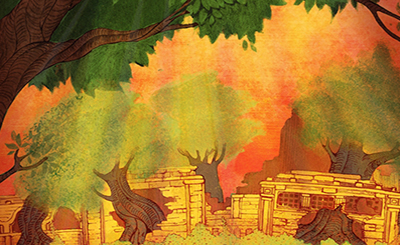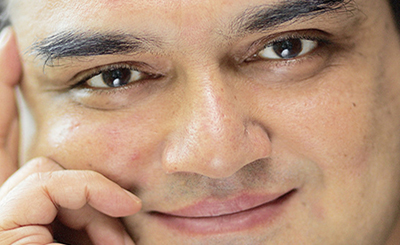
Five poems by North Carolina-born Bethany W. Pope, whose six collections of poems have been published in the last five years. Her first novel, Masque, was published by Seren in 2016.
Donate Now
Getting There
You have to learn how to forget yourself,
that idea you carry around like a satchel
full of rocks: the one your father gave you.
You cannot afford both dignity
and adventure — they tally up the same
at the register and your funds
are limited. So. Forget how you look,
how you would like to be seen, and veer
right off of the paved road. Forget your car —
it can’t take you where you need to go.
Forget your good shoes. The mud will destroy
them. I wouldn’t recommend professional
attire. Mud and wool-blend do not make
good bedfellows. Lipstick’s ok; it can
double as war-paint. Leather’s better
since it resists tears. Follow the edge
of the pavement, along the treeline,
and (eventually) you’ll come to a break
in the nettles. A tunnel will open
up in the greenery, a path worn bare
by badgers, or foxes. Crouch down, low,
where the scent is strong, and crawl into
the bracken where tufts of strange hair are caught
on the thorns. These thorns scratch your face. Blood
brightens your cheeks so that, by the time
you emerge, you resemble something
new-born, something unnamed: a brother
to spiders, to sparrows — a sister to crow.
Follow the sound of running water,
the promise of a drink, cool and clear,
lapping over your tongue. It’s the taste
of the first rain that ever fell on earth
and, when you find it, a light will open
up inside you, something green, something gold,
and the eyes you open will remember
that there is life beyond the city,
that the city, the people, are limited,
and you will remember the name your mother
whispered into your brain through the well
of your ear while her blood was still drying
on your skin and you were nothing but joy,
joy and the promise of her own completion,
and everything was good in the world.
Dirty
You are a kind that is familiar
in every nation, middle-aged, from
the upper middle-class, with a Waitrose
accent, expensive outdoorsy boots (unscuffed)
and though you are balding, your skin has that
sleek, buttery-smooth look that comes
from regular spa-days. You are very
tall, with a good, strong frame, which (I’m sure)
you hope your boys inherit. Your wife
is small, and just your age. Her gold-plated
hair brushes her shoulders and every
strand is daily hammered straight. Your children
have perfectly blended features. They will
be as attractive as you were, once.
I know that you were attractive, once.
It’s written on your face. And there I was,
facing you, facing your wife, reading
the solid cost of your watch, the tasteful
heft of her two rings (understated,
elegant) with their terribly clear diamonds,
telling you that (for once) you could not get
exactly what you wanted. The film was
rated fifteen. Your children were between
thirteen and eleven. When I pointed
out the sign with the law printed on it
(laws passed by people sharing your accent
which, if broken, would result in a fine —
to be paid by myself — of two-thousand pounds)
and asked for ID, you bent down between
hunched shoulders and thrust your arched raptor’s nose
almost between my eyes, as though you’d like
to gouge holes in my cheeks. Your spittle flew
as you cawed your disbelief, ‘Are you calling
me a liar? My children are above
the age. How dare you call me a liar
you little foreigner!’ And that is when
I called the manager. Minimum wage
is not nearly recompense enough
for being drenched in your warm saliva.
You pecked at a man (earning eight pounds per hour)
for a solid ten minutes, measured
by the hands of your Rolex. In the end,
documents were produced, or at least
some agreement was reached. You were waved through
one more of life’s tiresome little doors,
ushered past one more exhausted, little,
foreigner. Your wife flashed her perfect teeth
at me, her blue eyes crinkling (attractively)
at the corners, and you took her hand
as you stalked the long corridor.
Dionysus
For Matthew David ClarkeMy God, you were a beautiful boy:
skin like marble, still warm from the chisel,
as yet unpainted, with your hairless
torso, graceful wrestler’s stance, and neat dick,
curled into its nest of reddish pubic
hair, like a new-born animal. You wore a robe
of cheap black cotton, and your long honey-
coloured hair just brushed your still-broadening
shoulders. Your face was long, and square. I’d made
a bet with you, the month we started dating,
wagering that you couldn’t grow a beard
yet. I was wrong. It thrived; long, thick, and wild
as grapevines twining, lightning fast, along
the mast of a ship. You drew me, drunk,
into new and deeper waters, wine-dark
seas where I (terrified of drowning) found,
to my surprise, that I could swim as surely
as a dolphin. And so, you transformed me.
If you were my statue, my ideal
lover, kissed into life, then I was your hot,
mutable wax — a myth reborn into
a new and different form, maintaining, somehow,
the same substance. I did not know what I felt,
the first time I trimmed your beard (standing
together, before the mirror, in some
anonymous dorm room) but I saw my hands,
I saw the shears moving in them, severing
the threads of your life, defining your features,
and my mouth spoke three small, unbidden words.
Your sculptured face warmed beneath my fingers,
flushed red as an altar slaked with rich wine,
and you fled down the hall, terrified
at finding yourself so suddenly alive.
My hands were empty, when I sought you out
(gathering tufts of your hair, from the floor
like golden hanks of Apollonian
wool, snared in the brambles) approaching
your room. I remember the way that my chest
throbbed, as though it were a wooden box, laden
with the Beauty of the Goddess of Death.
I remember that your door was closed, but
the lyre of Orpheus opens all portals,
and music came pouring out from the seams
in this one; The Beatles singing, ‘Yeah, yeah yeah’
and there you were, behind it, naked
and ready, grinning up from your bed.
Nightriding
This town is more than bearable, at night,
when the well-masked people are safe in bed,
staring at the raw, veined surface of their
eyelids, their minds naked and, for once, honest —
if only in the métier of dreams.
The crazies are out, en masse, of course,
and I am one of them, but at least our
intentions are always bluntly obvious.
The blond boy with the dirt-caked fingers
(they look like they’d taste of engine oil
and the runoff of gardens) crouches
by the sliding doors of the always-open
Tesco, wrapped in a yellowing duvet,
begging for full-fat soda and used books.
The obese man whose dark, sparse hair is drawn
into a Pebbles Flintstone topknot, screeches
vaguely at a lamppost, his heavy
breasts heaving erotically against
the thin fabric of his tuxedo shirt
with each breath. There’s a prostitute down
on Manchester Road who tempts me with
a cigarette every time I pass
because I threatened a man with my bike-
chain, once, on her behalf. She’s forty, fair,
and her lips are always a little quirked,
as though she’s trying not to laugh. It’s not
beautiful, here, even in daylight.
The buildings are bleak and cheap in equal
measure, and when you find a tree downtown
there’s probably a condom caught somewhere
in the branches, but it’s honest about
what, exactly, it’s made of. In daylight,
the world pretends to civilization.
People behave, people are ‘nice’, but only
if it doesn’t cost them very much,
only if it’s next to effortless.
I much prefer the honest look of agony,
the naked, painful bones which cannot lie.
I like the sweet cold taste of the air,
once the exhaust has been blown out of it.
Deadpool
I am the consummate occasional
misanthrope: the kind of person who seems
amiable enough, for the most part —
willing to change your flat tyre in a pinch,
or call you a cab when your boyfriend
strands you somewhere distant (in the rain)
because you weren’t in the mood to give him
head, but every so often I’m swallowed
by my own acerbic inclinations. Then,
all I really want to do is walk through town,
with a good stick, knocking the hats off of
every covered head. I’m prone to picking
fights then, too, about anything, everything —
any minor slight will do. And this is why
I’m glad my little sister sent me that
Deadpool onesie for Christmas. At comic-con,
only the assholes dress up as Deadpool,
it’s almost a uniform, almost a badge —
that jolly red mercenary with the smart
mouth and dumb brain, who can take more
punishment than Wolverine and walk away,
smiling. We’re talking about the kind of jerks
who mock children for their taste in comics
and grab the buttocks of the booth-girls.
It’s easy to be brave when you’re pretending
to be someone else, and misanthropy
blooms from a kernel of fear. Recognizing
this buried desire for safety in myself,
the need to be invulnerable,
and being unwilling to leave home
dressed in a pair of adult-sized footie
pyjamas, I draw the red hood over
my head and compromise with my baser
urges. I’ll pour a mug full of Bovril,
curl up on the couch, and read the merry
adventures of an unrepentant ass,
who does all of the things that I would
(sometimes) like to try out on the neighbors,
if society were not necessary,
if there could be no consequences.
More from The Byword
Comments
*Comments will be moderated











